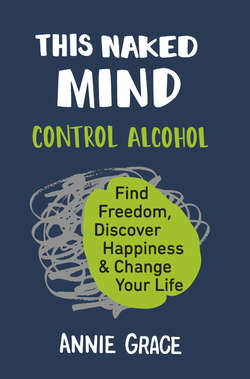Читать книгу This Naked Mind - Annie Grace, Annie Grace - Страница 13
Оглавление4.
LIMINAL POINT: IS DRINKING A HABIT?
“The chains of habit are too weak to be felt until they are too strong to be broken.”
—Samuel Johnson
I’ve organized the book in a unique way in order to use Liminal Thinking to shine the light of conscious thought on ingrained beliefs about alcohol. You will find the narrative chapters of the book interspersed with mini-chapters called “Liminal Points.” A Liminal Point will take you on a journey through certain, ingrained beliefs about alcohol. I want to deal with these beliefs throughout the book, instead of all at once, to allow you to test the logic in the midst of your daily life. This will allow you to examine what you believe to be true against external sources. What observations and assumptions have you made? What experiences have you had? What conclusions have you drawn?
To deconstruct why we might believe drinking is a habit, we must look at how this belief was unconsciously created.
We have already discussed how our experiences and observations affect our unconscious mind and our desire to drink. Since it is impossible to notice, experience, or observe everything, we unconsciously put our experiences and observations through a lens of relevance that is shaped by our personal needs. From these relevant experiences and observations we make assumptions, and from those assumptions we draw conclusions. From conclusions we form our beliefs. Once we’ve established a detailed framework of why you believe what you believe, I will reveal another perspective, one that may be closer to reality, in narrative form. In this manner we will submerge beneath the surface of your conscious and deconstruct your beliefs about alcohol.
Note: With each Liminal Point we will go through the above steps, so you may want to mark this page and refer back to it from time to time.
Your experience is that you regularly drink. You also observe regular, habitual drinking around you. You assume because of how frequently drinking occurs, not only in your own life, but also in the lives of those around you, that drinking must be habitual. This is an easy assumption. It is more palatable than the assumption that you, and those around you, drink regularly because you have become dependent on alcohol. A habit doesn’t feel threatening. You conclude that drinking, because it is so regular and you are afraid to look for a more sinister reason, must be a habit.
Let’s explore reality:
It’s Just a Habit
Many people justify their drinking by saying it is just a habit. And indeed, drinking may have started as a habitual routine. You went to a party and had a drink, or you got home from work and had a drink. The thing about habits is that they, by definition, encourage your brain to think less.47 Once something has become habitual, like driving or brushing your teeth, you no longer consciously think about it. This is great—it frees up brainpower, allowing us to focus on new and different things.48 So if your drinking started as a habit, there is a good chance you often drink without thinking too much about it. Over time, drinking became more than a simple habit.
If drinking was truly a habit, when I was pregnant, I would have been perfectly happy drinking non-alcoholic beers. Non-alcoholic beers tasted similar, but I couldn’t bring myself to drink more than one. It was the alcohol, not the taste, I wanted. Similarly, if heroin was a habit, perhaps the addict could shoot up a syringe of saline? With some effort, aren’t most habits relatively easy to break?
Would you allow your wife to leave you, your kids to hate you, your money to bleed away, and your self-respect to abandon you because of a habit? And if drinking was simply a habit, why does the alcoholic, who has been sober for fifteen years, still take it one day at a time? There is no other habit where this is the case.
When we give up a habit like biting our nails, notoriously difficult to do, we don’t feel deprived because we no longer gnaw on our fingertips. We don’t worry we will live our lives missing out on an authentic pleasure. We may habitually drink, but drinking is not a habit—it’s an addiction. Yet the majority of drinkers believe they drink because they want to, they enjoy it, and they choose to do it.
Say I offered you two hundred thousand dollars to stop drinking. Would you? Do you have to think about it? What about a half million? You can buy a beautiful home, but you can never drink again. If drinking was a habit, there would be no hesitation. For a half million dollars you wouldn’t hesitate to break a habit—no matter how much effort it took.49
With justifications such as these, we aim to prove we are in control. The fact that we spend so much time defending our alcohol intake proves the opposite. All drugs do this—you try to prove you are not dependent, not controlled. It is the fear that keeps us drinking, and the alcohol itself creates the fear. We fear that we will never be happy or at peace without drinking and that stopping will mean we will feel unhappy—that we are missing out. If you believe these false justifications, even after you stop, when your health has improved and your relationships have been restored, you will continue to envy drinkers. You will believe their reasons for drinking and feel jealous that they are drinking when you are not. But when you recognize that their reasons are unfounded, you’re not jealous at all—you rejoice in your newfound freedom.
Is your alcohol habit truly a habit?
